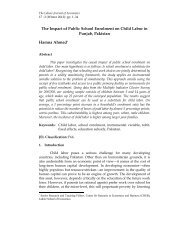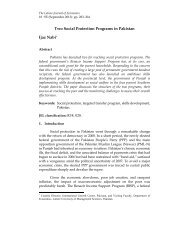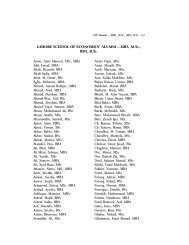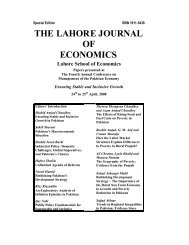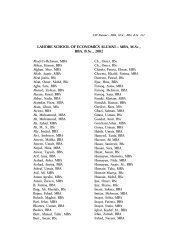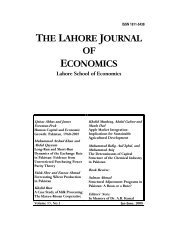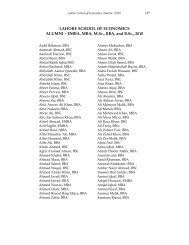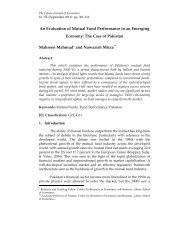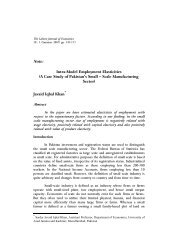Special Edition-07.pdf - Lahore School of Economics
Special Edition-07.pdf - Lahore School of Economics
Special Edition-07.pdf - Lahore School of Economics
Create successful ePaper yourself
Turn your PDF publications into a flip-book with our unique Google optimized e-Paper software.
The <strong>Lahore</strong> Journal <strong>of</strong> <strong>Economics</strong><br />
<strong>Special</strong> <strong>Edition</strong> (September 2007)<br />
Pakistan Financial System - The Post-Reform Era<br />
Maintaining Stability and Growth<br />
Shakil Faruqi *<br />
Abstract<br />
The financial system <strong>of</strong> Pakistan has undergone a sea-change owing<br />
to reforms which were implemented over a period <strong>of</strong> a decade and a half,<br />
1992-2006. The financial system has moved towards promoting the<br />
efficiency <strong>of</strong> financial intermediation while maintaining stability and<br />
fostering growth <strong>of</strong> the economy. Financial repression <strong>of</strong> the previous<br />
decades has receded though it has not been eliminated. Now a shift is<br />
warranted for the reform and restructuring <strong>of</strong> sectoral or sub-sectoral finance<br />
which has to be activity based, not institution based. Pakistan’s financial<br />
system has entered the post-reform era with all its potentials, complexities<br />
and challenges. How well the financial system performs in this era depends<br />
on how sustainable the financial regime is and how resilient it is in coping<br />
with change and financial shocks, both domestic and global.<br />
I. Leading Concerns<br />
The financial system <strong>of</strong> Pakistan has undergone a sea-change owing<br />
to reforms that were initiated in the early 1990s rather gingerly, but<br />
subsequently gathered momentum, culminating in accelerated change in the<br />
structure <strong>of</strong> the financial system and a revamping <strong>of</strong> the policy and incentive<br />
regime that governed its operations. The reform era lasted for nearly a<br />
decade and a half, 1992-2006. A great deal has been accomplished during<br />
this period as summarized in this paper. There has been a paradigm shift in<br />
the financial policy regime that prevailed prior to the reform era and also<br />
during the early 1990s. These achievements have occurred amidst powerful<br />
economic and financial constraints that have persisted for many years and<br />
unprecedented events that have occurred in-between, both domestic and<br />
foreign. The financial system has moved towards promoting the efficiency <strong>of</strong><br />
financial intermediation while maintaining stability and fostering growth <strong>of</strong><br />
the economy. It is an enviable record <strong>of</strong> accomplishments by any standard.<br />
* Pr<strong>of</strong>essor, The <strong>Lahore</strong> <strong>School</strong> <strong>of</strong> <strong>Economics</strong>, <strong>Lahore</strong>.



